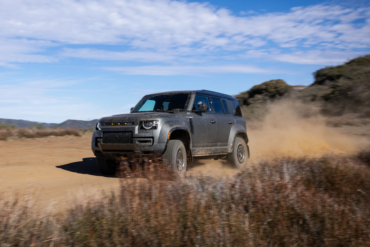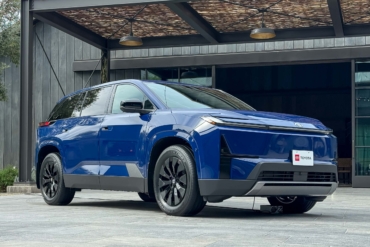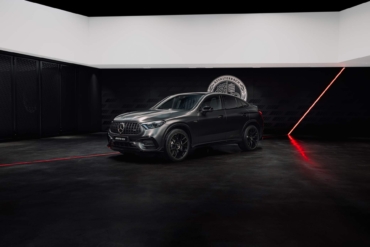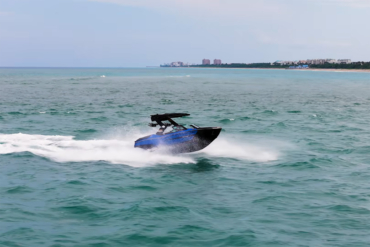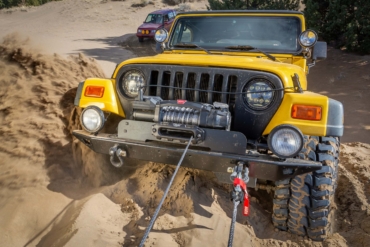The Rubicon is an essential model in Jeep’s lineup and wouldn’t have happened if not for the ‘Lunatic Fringe.’
The Jeep Wrangler Rubicon model is about to celebrate 20 years of being the ultimate factory off-road vehicle. How the Rubicon model came to be is a story of passion and commitment from a group inside the company (not so lovingly) called the “Lunatic Fringe.”
In the video below, Jeep Head of Design Mark Allen sits down with Gone-GPN’s Chris Collard in the Jeep Rubicon 20th-anniversary concept at the Easter Jeep Safari to talk about the history of the Rubicon. The two talk about the original Jeep Rubicon, the future of the vehicle, and the history of the Rubicon Trail.
Allen describes the team that worked on the original as “hobbyist off-roaders.” Tuning into trends in the off-road industry, they modified their Jeeps into more capable off-road beasts.
Jeep Rubicon Catered to Rock-Crawlers
The team knew what rock-crawlers wanted, and they wanted to give it to them.
A 4:1 low-range transfer case would add torque multiplication at the wheels as well as finesse at low speeds. Taller tires would help add ground clearance and allow a vehicle to roll over obstacles instead of dropping into them. And underbody protection would aid in preventing trail damage.
Allen said team members used their personal credit cards to help pay for their ideas — not something that would work in corporate America today. The name Lunatic Fringe (check the video for the team logo) was given to the team “because everyone thought they were crazy to even try to do that.”
Jeep Thought Nobody Wanted to Off-Road for Fun

Allen acknowledges it sounds strange today, but at the time, he said, Jeep corporate looked at them as oddballs for wanting to off-road for fun. The company knew buyers were doing hardcore off-roading, but they thought it was a small segment.
But the group eventually got approval to make what would become the Jeep Rubicon, based on the 2003 Jeep TJ. It had Dana 44 axles with air-activated Tru-Lok differentials front and rear. It also had that 4:1 transfer case, diamond-plate rock rails, and 31-inch Goodyear MT/R off-road tires. (Remember when 31-inch tires were considered tall?)
The brand’s marketing team predicted that Jeep would sell 3,000 in the first year, and then sales would fall off a cliff after that. They couldn’t have been more wrong.
Ten years later, Jeep launched the 10th-anniversary-edition Rubicon. It got the same transfer case, same Dana axles, and now had 32-inch tires, plus special seats, interior accents, and unique bumpers.
Rubicon Now One-Third of Wrangler Sales

Today, more than 30% of Jeep Wrangler sales are Rubicon trim. That’s more than 60,000 Rubicons per year! That’s why Jeep is getting ready for the 20th anniversary of the Rubicon, which is next year.
Jeep won’t confirm exactly what the plans for next year’s 20th-anniversary-model Rubicon are, or even if it’s officially going to offer a special model. But the Easter Jeep Safari concept is likely going to be pretty close to the mark.
Last month, we spent time behind the wheel of the concept. The basics are steel bumpers, an integrated winch and air compressor, and 37-inch tires. If that’s how you measure progress, that’s 6 inches in 20 years and would tie the Jeep for the tallest off-road tires — the Ford Raptor can also be had with 37s.
Rubicon Trail: The Route That Lent Its Name
Of course, the Jeep Rubicon couldn’t exist without the Rubicon Trail. In the previously mentioned video, Collard discusses the trail’s history, from the early days when it was a trading route to when it could be driven by early cars and had a hotel.
The 22-mile route, now primarily a 4×4 trail, is located between Lake Tahoe and Sacramento. It’s where Jeepers came to play and has been home to a Jeep Jamboree since 1997. It has long been a test site for Jeep and for aftermarket suppliers that work to make Jeeps more capable.




